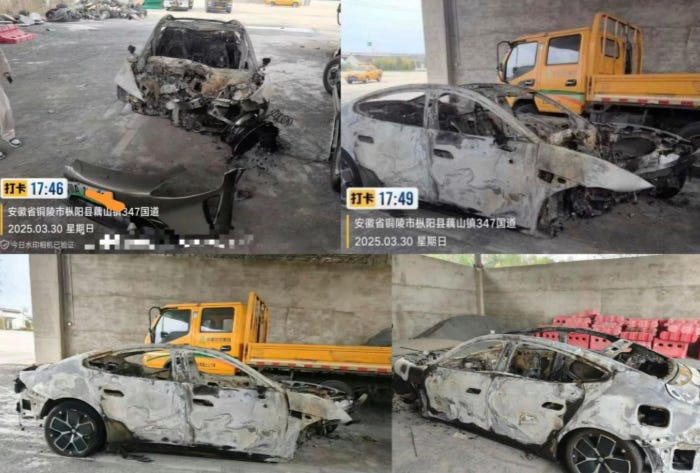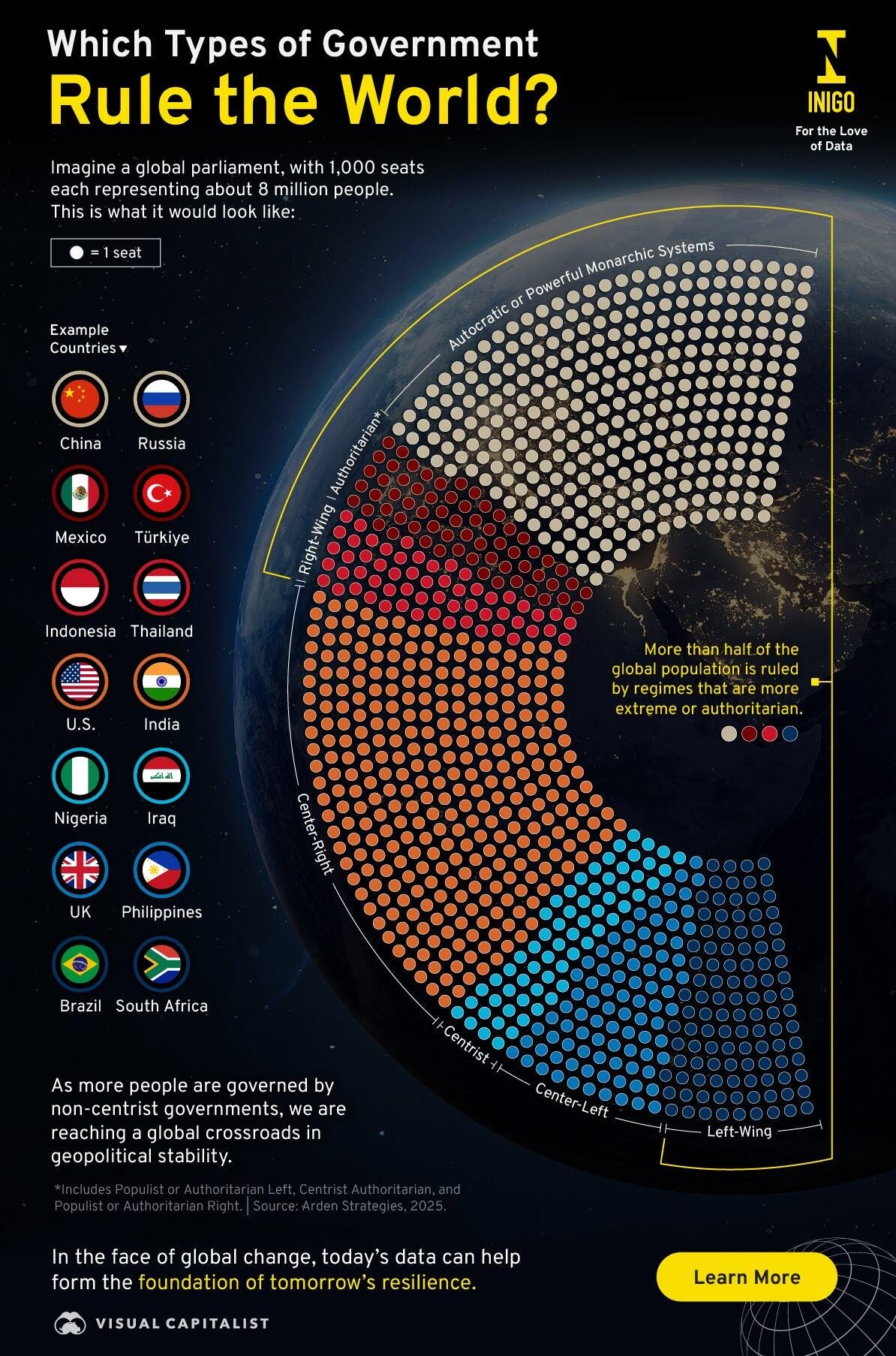The Weekly Weird #66
Farewell Klaus Schwab, autopilot no longer 'intelligent', things are turning and Howe, China's robotaxis, the Uyghur sanction, one chart to rule them all
Welcome back to your Weekly Weird!
Everything out there is fine and dandy and not at all worrying.
Also, when are they taking applications to live on Mars as part of an autarkic colony ruled by a mad billionaire dictator?
In the meantime, what’s going on here on Earth?
Farewell Klaus Schwab: The World Economic Forum’s chairman and founder Klaus Schwab (pictured below at the moment of orgasm), once described by future Mars overlord Elon Musk as someone who “wants to be emperor of Earth”, is out “following a whistleblower letter that reportedly prompted his resignation,” according to Politico.
The Wall Street Journal broke the story:
The anonymous letter was sent last week to the Forum’s board and raised concerns about the Forum’s governance and workplace culture, including allegations that the Schwab family mixed their personal affairs with the Forum’s resources without proper oversight, according to the letter and people familiar with the matter.
It included allegations that Klaus Schwab asked junior employees to withdraw thousands of dollars from ATMs on his behalf and used Forum funds to pay for private, in-room massages at hotels. It also alleged that his wife Hilde, a former Forum employee, scheduled “token” Forum-funded meetings in order to justify luxury holiday travel at the organization’s expense.
[…]
The letter also raises concerns about how Klaus Schwab treated female employees and how his leadership over decades allegedly allowed instances of sexual harassment and other discriminatory behavior to go unchecked in the workplace, allegations that were raised in a Wall Street Journal article and previously investigated by the Forum. The Forum disputed the Journal’s reporting at the time, and Schwab denied the allegations against him.
In a press release that “acknowledged the outstanding achievements of the retired Chairman and Founder”, the WEF’s Board went on to say: “At a time when the world is undergoing rapid transformation, the need for inclusive dialogue to navigate complexity and shape the future has never been more critical.”
That “inclusive dialogue” of course takes place between an exclusive group of wealthy and/or influential invitees who converge on Davos to pay $43 for a hot dog and $2,500 per night for ‘companionship’, micro-dose on ’shrooms while the soldiers guarding them get “disciplined for cannabis consumption”, and circle-jerk themselves silly about the awesomeness of money, power, and technology or, in their special language, “stakeholder capitalism” and the “Fourth Industrial Revolution”.
The WEF is the same organisation that suggested during the pandemic that lockdowns were a good thing because they lowered carbon emissions. They also preside over a 170% increase in private jet use during their annual ‘Coachella for Billionaires’ because of all the concerned citizens flying into Davos to tell the rest of the world how to cut or tax their CO2 emissions down to ‘net zero’.
In the end, for all the Emperor Palpatine cosplay and prattling about “a more inclusive and sustainable economy for all”, the allegations point to the sordid if (based on human behaviour) unsurprising possibility that this was just a grift by a canny German mechanical engineer who figured out how to become a kingmaker: Throw parties in the Alps for the rich, famous, and powerful while telling them they’re doing it to save the world.
China’s Robotaxis: The workers’ paradise of the People’s Republic of China sure does love having machines do the jobs people used to. An expected 500,000 robotaxis will be operating across China by 2030, according to research estimates. Here’s a time traveller from the 1960s experiencing the wonders of one of them in Beijing.
Under the watchful eye of the Party, companies are rolling out driverless taxis in a big way, according to Forbes:
Chinese authorities at many levels keep a close watch over Chinese robotaxi companies. They must get approval for all levels of operation which control where they can test and operate, and how much supervision is needed. Operation begins with testing with a safety driver behind the wheel (as almost everywhere in the world,) with eventual graduation to having the safety driver in the passenger seat but with an emergency stop. Then they move to having a supervisor in the back seat before they can test with nobody in the vehicle, usually limited to an area with simpler streets. The big jump can then come to allow testing with nobody in the vehicle, but with full time monitoring by a remote employee who can stop the vehicle. From there they can graduate to taking passengers, and then expanding the service to more complex areas. Later they can go further, and not have full time remote monitoring, though there do need to be remote employees able to monitor and assist part time.
The Chinese approach contrasts strongly with the more laissez-faire approach taken in the United States.
Chinese jurisdictions require that the system in a car independently log any “interventions” by safety drivers in a sort of “black box” system. These reports are regularly given to regulators, though they are not made public. In California, companies must file an annual disengagement report, but they have considerable leeway on what they consider a disengagement so the numbers can’t be readily compared. Chinese companies have no discretion on what is reported, and they may notify authorities of a specific objection if they wish to declare that an intervention logged in their black box should not be counted.
There are strong arguments against such strict reporting. Safety drivers are told to intervene when they have any doubt, which means they will frequently intervene when not necessary. Because companies with mandatory reporting of all interventions want to keep their number down, they may, even unconsciously, discourage interventions. They also don’t want to have to count things like bathroom breaks which have no bearing on safety, leading to the wrong incentive. On the other hand, giving companies full leeway on what counts led to essentially useless reports in California. The right answer is hard.
This more strict regulation reportedly also has its own Chinese “flavour” and personal relationships are also important to get permits and deploy. Even so, it’s not slowing things down much, if at all.
Pony.ai, a robotaxi manufacturer clearly unfamiliar with Cockney rhyming slang1, has already launched its seventh-generation model “equipped with six types of mass-produced sensors, including 9 LiDAR sensors, 14 cameras, 4 millimeter-wave radars, 4 microphones, 2 water sensors, and 1 collision sensor…[enabling] 360° blind-spot-free detection around the vehicle and environmental monitoring within a 650-meter range.”
Johnny Cab is coming soon! Meanwhile, in the not-so-good-news department…
Autopilot No Longer ‘Intelligent’: China’s Global Times reports that “Chinese electric vehicle (EV) manufacturers are adjusting promotional terminology for advanced driving systems, replacing terms like "intelligent driving" with descriptions such as "assisted driving" to align with stricter regulatory definitions.” Why the change in nomenclature?
Possibly the recent crash of an “intelligent” Xiaomi SU7 that killed three people?
More from Global Times:
An industry analyst attributed this terminology recalibration to growing regulatory scrutiny. "Overly optimistic terms like 'fully autonomous' created dangerous gaps between consumer expectations and technological realities," Wu Shuocheng, a veteran automobile industry analyst, told the Global Times on Monday. "Standardized labeling helps reset public understanding."
If they’re really going to “reset public understanding”, maybe call it “incredibly dangerous technology”? Just a thought.
The Uyghur Sanction: According to their recent press release:
The World Uyghur Congress (WUC) has filed a legal complaint in Paris against Dahua Technology France, Hikvision France, and Huawei France. The submission, made by prominent French human rights lawyer William Bourdon of Bourdon & Associés, accuses the three Chinese companies of complicity in crimes against humanity perpetrated against the Uyghur people in East Turkistan.2
The charges aimed at the surveillance technology companies listed above are:
Concealment of complicity in the crime of aggravated servitude
Concealment of complicity in the crime of trafficking in human beings as part of an organized gang
Concealment of complicity in genocide
Concealment of complicity in crimes against humanity
The WUC claims that “the three companies helped build and maintain a mass surveillance system in East Turkistan, supporting the Chinese government’s discriminatory policies”.
Both Hikvision and Dahua have supplied advanced surveillance technologies, including AI-powered facial recognition systems, to the Chinese government. Hikvision cameras have been documented around mosques, schools, public streets, and even inside Uyghur homes. Leaked internal documents and independent research have shown that Hikvision developed software capable of identifying Uyghur individuals specifically, alerting authorities based on ethnicity.
Similarly, Dahua has been implicated in providing facial recognition technology designed for racial profiling. These systems have been used as tools of repression, contributing to the Chinese state’s mass internment and monitoring of Uyghurs.
Huawei, a leading provider of telecom infrastructure and smart city technologies, has also played a role in these abuses. The company reportedly partnered with the Xinjiang Public Security Bureau on a “joint innovation lab” focused on policing technologies. Internal company documents reveal that Huawei tested facial recognition systems capable of flagging Uyghurs in crowds.
Also, according to a report from Diálogo Americas, “Chinese companies Hikvision, Dahua, and EZVIZ now dominate the Ecuadorian market”.
“It’s a kind of big brother or surveillance system of the People’s Republic of China. Our citizens are victims of a lack of control and guarantees that the use of information and image transmission will be completely respectful of issues such as privacy,” says [Ecuadorian political scientist Bernardo Gortaire] Morejón. According to the expert, “the data can be used to build models within China for China’s benefit, which can also take advantage of the situation of insecurity that our country is going through.”
Raw surveillance, such as the installation of thousands of Hikvision facial recognition cameras across the country, is only part of the issue - Chinese tech has become interwoven into the fabric of the country’s critical infrastructure.
The national surveillance and emergency response system ECU-911, developed by China National Electronics Import & Export Corporation (CEIEC) and Huawei, also uses Chinese software. ECU-911 consists of 16 regional response centers that operate a national network of 4,300 cameras monitored by the Ecuadorian Police, from the Galapagos Islands to the Amazon. The entire system is continuously updated through Chinese products and companies.
Huawei has also grown a lot in cloud services. Its clients include Ecuador’s state-owned telecommunications company, the National Telecommunications Corporation (CNT) and, consequently, several government institutions that use CNT.
According to Paúl Mena Mena, “an Ecuadorian investigative journalist and member of the International Consortium of Investigative Journalists (ICIJ)”:
“If a state has penetration into the national security of your state, it is doubtful whether the security system is protecting the interests of Ecuadorians or whether in some way that information, those tools, those methodologies may instead be being used in the interests of a power such as China.”
Meanwhile, in Serbia, the same Chinese companies are “accused of dominating the surveillance security space in Serbia where the government is also faulted for allowing an unregulated surveillance market to thrive”, according to Biometric Update.
Balkan Insight reported on the growing Serbian surveillance state:
The Serbian police and intelligence agencies are increasingly buying advanced video surveillance systems on a large scale, with one BIRN investigation finding the state has imported over the past decade more than 20 International Mobile Subscriber Identity, or IMSI, catchers capable of indiscriminately harvesting communications from mobile phones. Yet during that time, the state has failed to update legislation that would regulate their use.
Good times all round then.
Things Are Turning, And Howe: Neil Howe, of The Fourth Turning fame, did an interview recently in which he offered his view on what seems to be increasing instability and uncertainty not only in the United States but worldwide.
“America is now well into a fourth turning, the bust part of its cycle, where the status quo falls apart often chaotically and is replaced by a brand new order,” he told Adam Taggart. “This is a global trend, this is a global generational trend I should say, and it's what we should expect, it's what we should be anticipating. The decline of globalization really started at the end of the GFC and it's now accelerating.”
His prediction is that a first turning, when the cycle begins anew with a kind of golden age, will come some time “in the 2030s”, but “history also suggests we need some sort of conflict…that would really ensure that people actually reshape institutions for a reason.”
One Chart To Rule Them All: A serious bummer of a chart created by Visual Capitalist and Inigo based on data from Arden Strategies’ Global Parliament Index shows that “autocracies and powerful monarchic systems are the most common form of government on a population-adjusted basis, ruling 31% of the global population.”
The chart visualises all the governments in the world as part of “a hypothetical global parliament with 1,000 seats, each representing about eight million people”, an ironic method considering the preponderance of authoritarian, autocratic, and “powerful monarchic” regimes.
Pour one out for our cousins under the jackboot, everyone.
That’s it for this week’s Weird, everyone. I hope you enjoyed it.
Outro music is So Long, Farewell from The Sound of Music, dedicated to the human Mr Peanut, Klaus Schwab.
Stay sane, friends.
Pony and trap = crap
Or the Chinese province of Xinjiang, depending on your map.









To be certain, the Chinese are, and have been, surveilling the world in every way possible. There have been alarm bells concerning Huawei but apparently not everyone got the message. Pity.
Definitely going to be avoiding all AI taxis! Sheesh! Too much risk in my opinion.
Solid installment...I've been so busy these days I've missed a lot of your installments I am certain. Glad to know you are still helping folks realize the weird world we live in!